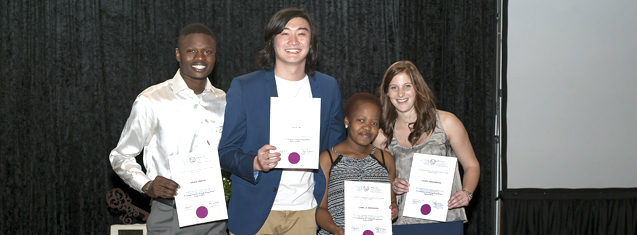Latest News Archive
Please select Category, Year, and then Month to display items
12 October 2020
|
Story Arina Engelbrecht
|
Photo Supplied
 Arina Engelbrecht from Organisational Development and Employee Well-being believes physical activity has a number of benefits for one’s health, including stress relief.
Arina Engelbrecht from Organisational Development and Employee Well-being believes physical activity has a number of benefits for one’s health, including stress relief.
Being physically active plays a big role in preventing the development of mental-health problems and in improving the quality of life of people experiencing mental-health problems.
Treatment for depression
Physical activity can be an alternative treatment for depression. It can be used as a stand-alone treatment or in combination with medication and/or psychological therapy. It promotes all kinds of changes in the brain, including neural growth, reduced inflammation, and new activity patterns are formed that promote feelings of calm and well-being. It releases endorphins – powerful chemicals in the brain that energise your spirit and make you feel good.
Physical activity can be very effective in relieving stress. Research in adults has found that physically active individuals tend to have lower stress levels compared to individuals who are less active. It also leads to improved sleep. When a person sleeps better and feels more rested, overall quality of life improves. They cope better with daily life stressors.
Reduce Alzheimer's risk
Regular physical activity can reduce your risk of developing Alzheimer's disease by up to 50%. It can also slow down further deterioration in those who have already started to develop cognitive problems. It stimulates the brain’s ability to maintain old connections as well as to make new ones.
A study asked people to rate their mood immediately after periods of physical activity (e.g. going for a walk/run, cycling, doing housework) and periods of inactivity (e.g. reading a book or watching television). Researchers found that participants felt more content, more awake, and calmer after being physically active compared to after periods of inactivity.
In conclusion, people who are physically active feel a sense of well-being, feel more energetic throughout the day, sleep better at night, have sharper memories, and feel more relaxed and positive about themselves and their lives.
“Being physically active not only changes your body, it changes your mind,
attitude, and your mood.” – Arina Engelbrecht
Leadership for Change celebrates graduation ceremony
2014-10-15

The Leadership for Change Programme hosted its third annual graduation ceremony on 9 October 2014 at the Centenary Complex on the Bloemfontein Campus.
The event consisted of two segments. The first was aimed at the group who has travelled abroad during the past year. They were presented with special certificates acknowledging the work they have done during their participation in the programme.
The second element of the evening was to wish the 2014/2015 group all of the best for their upcoming travels. This group will be travelling abroad during next year. Of the 250 applicants, the top 32 students were chosen to be part of the Leadership for Change Programme.
Prof Jonathan Jansen, Vice-Chancellor and Rector, said, “I hope you came back with the capacity to distinguish right from wrong – not only through law, but morally as a leader.”
Waldo Staude, Vice-president of the Student Representative Council (SRC), acted as Chair to the evening’s proceedings. He is also an alumnus of this programme.
“This programme has made its mark as we observe the number of leadership positions our students from the programme hold on this campus,” Staude said. “We have eight Leadership for Change students in the SRC for the 2014/15 term.”
The Leadership for Change Programme each year gives first-year students exposure to top universities throughout the world. Its focus is to establish a new campus culture of student relations across boundaries.
Six cohort groups – of between five to six students each – will visit universities on three different continents in January 2015. Each group will be accompanied by a UFS staff member serving the role of mentor.
The universities they will be visiting (according to continent), are:
USA
Cleveland State University
University of Minnesota
University of Vermont
Europe
The Netherlands: Vrije University in Amsterdam
Belgium: University of Antwerp and Ghent University
Asia
Japan: International Christian University